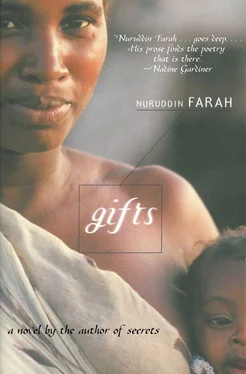Nuruddin Farah - Gifts
Здесь есть возможность читать онлайн «Nuruddin Farah - Gifts» весь текст электронной книги совершенно бесплатно (целиком полную версию без сокращений). В некоторых случаях можно слушать аудио, скачать через торрент в формате fb2 и присутствует краткое содержание. Год выпуска: 2011, Издательство: Arcade Publishing, Жанр: Современная проза, на английском языке. Описание произведения, (предисловие) а так же отзывы посетителей доступны на портале библиотеки ЛибКат.
- Название:Gifts
- Автор:
- Издательство:Arcade Publishing
- Жанр:
- Год:2011
- ISBN:нет данных
- Рейтинг книги:3 / 5. Голосов: 1
-
Избранное:Добавить в избранное
- Отзывы:
-
Ваша оценка:
- 60
- 1
- 2
- 3
- 4
- 5
Gifts: краткое содержание, описание и аннотация
Предлагаем к чтению аннотацию, описание, краткое содержание или предисловие (зависит от того, что написал сам автор книги «Gifts»). Если вы не нашли необходимую информацию о книге — напишите в комментариях, мы постараемся отыскать её.
Gifts — читать онлайн бесплатно полную книгу (весь текст) целиком
Ниже представлен текст книги, разбитый по страницам. Система сохранения места последней прочитанной страницы, позволяет с удобством читать онлайн бесплатно книгу «Gifts», без необходимости каждый раз заново искать на чём Вы остановились. Поставьте закладку, и сможете в любой момент перейти на страницу, на которой закончили чтение.
Интервал:
Закладка:
“It is interesting how the nurses perceive him,” commented Bosaaso.
“If they’re holding a loud conversation in the hospital corridor they hush on seeing Mire approach,” Duniya said. “He himself has told me that his nephews and nieces, playing noisily in their parents’ compound, fall quiet the instant they spot him.”
“So the nurses say unkind things about him?”
“Not terrible things, no.”
Bosaaso remembered how much his late wife’s mother had hated Mire. Yet Mire behaved as though none of this touched him. He was obviously at peace with himself and nothing else mattered.
Duniya volunteered, “People here are informal, no wonder he strikes some who come into contact with him as anti-social. Strange, but that isn’t how I perceive him.”
“No?”
Duniya looked at her unsteady hand which had knocked things over the very morning Bosaaso had come into her life disguised as a butterfly in a dream. She remembered how kind he had been, how touched she was by what he said. She couldn’t recall his precise words, only his kind gesture, a trace of his fondness for her.
“I perceive him as a timid man, shy like a child among adults he doesn’t know how to deal with. I’ve watched him in situations where he’s withdrawn into himself, showing nothing but his exterior self, like a turtle under attack.”
“That’s nice,” said Bosaaso, smiling and thinking aloud. “A moving description, very poetic.”
“In a letter, my brother Abshir reported to me how Mire himself had described his reticences being as prominent as the dimpled deformity of a mirror.” Why did Abshir’s name keep coming to her? Was it because of the ugly fight with her half-brother Shiriye?
Bosaaso was now slowing down. Had they already arrived? Duniya thought how much she would have loved the two of them to talk about personal matters that were of great concern to them. For instance, what about the baby? The subject of the foundling was bound to come up with Mire over dinner. She wished she had asked Bosaaso what his views were; wished she had told him hers. But he was already parked in a plot of undeveloped land alongside other vehicles, among them Mire’s Mini, which squatted midget-like next to the bigger cars.
Mire’s smile as he greeted them, Duniya thought, was the gesture of a man whom you happen to encounter at the very instant he has transferred a valuable treasure from one hiding place to another: secretive. The smile lingered, finally thinning to the size of Mire’s evenly trimmed toothbrush moustache. He stood a couple of inches shorter than Bosaaso, with a heftier physique than his childhood chum and a sonorous voice that was a delight to listen to. He now stepped aside, his posture erect, head showily bowed, his hand motioning them in saying, “Welcome.”
Entering, she thought she saw an inelegant expression on Mire’s face, of slight hesitation, of a man vacillating between two extreme moods, one formal, the other less rigid. Duniya grinned inwardly remembering another occasion when she had noticed such a sudden change of mood in him: the morning her hand ran amok, knocking over his pens, thermometers and pencils.
Bosaaso led them into the spacious living-room, which Duniya was delighted to note wasn’t extravagant. It was sparingly furnished, the decor simple, every item locally made. No loud colours, nothing the nouveaux riches associate with being chic, modern; no TV, no video machine, none of the sophisticated gadgets in which the computer age abounds, save a cassette-deck and a short-wave radio, the latter with its antenna up. Wallpaper and curtains matched harmoniously Was Bosaaso’s living-room in his two-storey palace as plain as this? Or was it distastefully exhibitionist? Duniya was delighted she had come to Dr Mire’s first.
The two friends stayed half a pace behind her, like professional waiters seating a VIP client. Reaching the sitting section of the room, Dr Mire encouraged Duniya to take the larger chair.
“Please,” he urged, guiding her gently towards the prominent armchair upholstered in green.
As yet neither of the men sat down. “To start with, what will you have, Duniya?” Mire was asking.
“Something non-alcoholic, if I may,” she replied.
Bosaaso meanwhile kept the civil distance of a head waiter, standing with hands behind his back, his whole body at the ready to be of help.
In response to their host’s list of what he could offer, Duniya said, “Orange pressé, please.”
“Certainly,” said Mire.
Suddenly there was too much movement. Mire left, walking backwards half the way, deferential. Bosaaso went to sit in the small armchair nearer Duniya. Mire halted just before entering the kitchen, did an about-turn and asked, “What will you have, Bosaaso?”
“The same as Duniya, please.”
“Keep it simple, keep it natural?” teased Mire.
Bosaaso nodded. But why wasn’t Mire leaving? Anxious, Duniya crossed, recrossed and uncrossed her legs, conscious of the eyes that were not focused on her. She was uncomfortably aware of the moisture of her armpits and the tightness of the dress at the waist. And Mire was walking away, promising to return shortly.
Alone, Bosaaso shifted closer to say, “Are you all right?”
She didn’t want to think of the immediate cause of the distress: her dress. “I’m fine, thank you,” she replied.
“Has either of us said something to upset you, Duniya?”
She wrenched her thoughts away from what had been distressing her. She said, “What have you told him about us?”
“Nothing.”
“I don’t believe you.”
“Not much really.”
“That’s not telling me a lot,” she said, keeping her voice low.
“I haven’t said much to him; only generalities.”
“What about the foundling?”
“I gave him the facts as I know them,” he responded.
“Such as what? What facts?”
“I’ve told him who discovered the foundling, where and how. Those sort of facts. And how we’ve registered him in both our names, as his co-responsibles. The bare facts, no embellishments.” He paused. “Now what has upset you?”
“I hate it when men take me for granted, as a woman,” she said.
It was his turn to say, “That doesn’t tell me a lot.”
They fell silent and apart, because Mire made his well-timed entrance, clearing his throat. He approached, bearing the tray. He carefully placed a small square table-napkin before each person. Duniya thought his flat had something dry-cleaned about it. Hardly any dust anywhere. She couldn’t work out how he isolated himself and his flat from Mogadiscio’s sandstorms or the rust and weight of its humidity. She received her drink from him with both hands, saying, “Mahadsanid ,” her head bowed in gratitude.
Mire served his friend, joking, “I’ve never known Bosaaso to drink anything non-alcoholic. I hope you realize what you are doing to him, Duniya.”
She said, “Special occasions impose certain restrictions on the will of those wishing to remember. Maybe that’s why he is having this sort of a drink, don’t you think?”
There was a light touch of annoyance in Mire’s voice, in the attitude of an elder brother preparing to reprimand a younger one. “You mean he’s already told you?” he said to Duniya.
“Told me? What?”
She sensed both men staring at her with engaging attentiveness. What were they talking about? Were they saying that Bosaaso had reformed and given up drinking alcohol altogether, this being an oblique reference to Taariq’s excessive use of this most poisonous substance?
Mire asked, “He hasn’t told you about Abshir?”
“My brother Abshir? What about him?” It couldn’t be bad news, since their faces opened up with smiles. “Tell me, I can’t wait.”
Читать дальшеИнтервал:
Закладка:
Похожие книги на «Gifts»
Представляем Вашему вниманию похожие книги на «Gifts» списком для выбора. Мы отобрали схожую по названию и смыслу литературу в надежде предоставить читателям больше вариантов отыскать новые, интересные, ещё непрочитанные произведения.
Обсуждение, отзывы о книге «Gifts» и просто собственные мнения читателей. Оставьте ваши комментарии, напишите, что Вы думаете о произведении, его смысле или главных героях. Укажите что конкретно понравилось, а что нет, и почему Вы так считаете.











